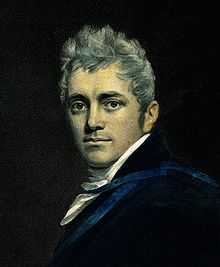Edward Daniel Clarke
| Edward Daniel Clarke | |
|---|---|
 | |
| Born |
5 June 1769 Willingdon, Sussex, England, Great Britain |
| Died |
9 March 1822 London, England, United Kingdom |
| Residence | England |
| Nationality | English |
| Fields | Natural history, mineralogy |
Edward Daniel Clarke (5 June 1769 – 9 March 1822) was an English clergyman, naturalist, mineralogist, and traveller.
Life
Edward Daniel Clarke was born at Willingdon, Sussex, and educated first at Tonbridge.[1]
In 1786 he obtained the office of chapel clerk at Jesus College, Cambridge, but the loss of his father at this time involved him in difficulties. In 1790 he took his degree,[2] and soon after became private tutor to Henry Tufton, nephew of the Duke of Dorset. In 1792 he obtained an engagement to travel with Lord Berwick through Germany, Switzerland and Italy. After crossing the Alps, and visiting a few of the principal cities of Italy, including Rome, he went to Naples, where he remained nearly two years.[1]
Having returned to England in the summer of 1794, he became tutor in several distinguished families. In 1799 he set out with a Mr Cripps on a tour through the continent of Europe, beginning with Norway and Sweden, whence they proceeded through Russia and the Crimea to Constantinople, Rhodes, and afterwards to Egypt and Palestine. After the capitulation of Alexandria, Clarke was of considerable use in securing for England the statues, sarcophagi, maps, manuscripts, etc., which had been collected by the French savants.[1]
Greece was the country next visited. From Athens the travellers proceeded by land to Constantinople, and after a short stay in that city directed their course homewards through Rumelia, Austria, Germany and France. Clarke, who had now obtained considerable reputation, took up his residence at Cambridge. He received the degree of LL.D. shortly after his return in 1803, on account of the valuable donations, including a colossal statue of the Eleusinian Ceres, which he had made to the university.[1]
He was also presented to the college living of Harlton, near Cambridge, in 1805, to which, four years later, his father-in-law added that of Yeldham. Towards the end of 1808 Dr Clarke was appointed to the professorship of mineralogy in Cambridge, then first instituted. Nor was his perseverance as a traveller otherwise unrewarded. The manuscripts which he had collected in the course of his travels, among them the celebrated Clarke Codex of Plato's dialogues (895 CE),[3] were sold to the Bodleian library for £1000; and by the publication of his travels he realized altogether a clear profit of £6595.[1]
Besides lecturing on mineralogy and discharging his clerical duties, Dr Clarke eagerly prosecuted the study of chemistry, and made several discoveries, principally by means of the gas blow-pipe, which he had brought to a high degree of perfection. He was also appointed university librarian in 1817, and was one of the founders of the Cambridge Philosophical Society in 1819. He died in London on 9 March 1822.[1]
Works
The following is a list of his principal works:
- Testimony of Authors respecting the Colossal Statue of Ceres in the Public Library, Cambridge (8vo, 1801–1803)
- The Tomb of Alexander, a Dissertation on the Sarcophagus brought from Alexandria, and now in the British Museum (4to, 1805)
- A Methodical Distribution of the Mineral Kingdom (fol., Lewes, 1807)
- A Description of the Greek Marbles brought from the Shores of the Euxine, Archipelago and Mediterranean, and deposited in the University Library, Cambridge (8vo, 1809)
- Travels in various Countries of Europe, Asia and Africa (4to, 1810–1819; 2nd ed., 1811–1823).
See also
References
- ↑ 1.0 1.1 1.2 1.3 1.4 1.5 Chisholm 1911.
- ↑ "Clarke, Edward Daniel (CLRK785ED)". A Cambridge Alumni Database. University of Cambridge.
- ↑ Edward-Daniel Clarke, Travels in Various Vountries of Europe, Asia and Africa (London: Cadell and Davies, 1814), third edition, second part, second section, pp. 345-6, 349, 361 – 362.
- ↑ "Author Query for 'E.D.Clarke'". International Plant Names Index.
- Attribution
![]() Chisholm, Hugh, ed. (1911). "Clarke, Edward Daniel". Encyclopædia Britannica (11th ed.). Cambridge University Press.
Chisholm, Hugh, ed. (1911). "Clarke, Edward Daniel". Encyclopædia Britannica (11th ed.). Cambridge University Press.
External links
- Otter, William (1827), Life and Remains of Edward Daniel Clarke (2nd ed.), New York: Collins and Hannay
- Excerpt from Clarke's Travels giving his account of the removal of the Parthenon sculptures
![]() This article incorporates text from a publication now in the public domain: Chisholm, Hugh, ed. (1911). Encyclopædia Britannica (11th ed.). Cambridge University Press.
This article incorporates text from a publication now in the public domain: Chisholm, Hugh, ed. (1911). Encyclopædia Britannica (11th ed.). Cambridge University Press.
|